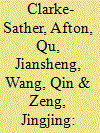| Srl | Item |
| 1 |
ID:
109418


|
|
|
|
|
| Publication |
2011.
|
| Summary/Abstract |
This study asks whether sub-national inequalities in carbon dioxide (CO2) emissions mirror international patterns in carbon inequality using the case study of China. Several studies have examined global-level carbon inequality; however, such approaches have not been used on a sub-national scale. This study examines inter-provincial inequality in CO2 emissions within China using common measures of inequality (coefficient of variation, Gini Index, Theil Index) to analyze provincial-level data derived from the IPCC reference approach for the years 1997-2007. It decomposes CO2 emissions inequality into its inter-regional and intra-regional components. Patterns of per capita CO2 emissions inequality in China appear superficially similar to, though slightly lower than, per capita income inequality. However, decomposing these inequalities reveals different patterns. While inter-provincial income inequality is highly regional in character, inter-provincial CO2 emissions inequality is primarily intra-regional. While apparently similar, global patterns in CO2 emissions are not mirrored at the sub-national scale.
|
|
|
|
|
|
|
|
|
|
|
|
|
|
|
|
| 2 |
ID:
153520


|
|
|
|
|
| Summary/Abstract |
This forum responds to recent calls to hypothesize a geopolitics of the Anthropocene by examining how our notions of geopolitics of water may shift in the context of this new and, at times, divisive framework. The Anthropocene describes the geological epoch in which humans are the dominant actor in the global environmental system and has been a concept that is not without controversy. Taking the Anthropocene as an epistemological divergence where nature can no longer be viewed as separate from humanity, this forum asks how moving away from understanding hydraulic systems as essentially stable to understanding them as unstable and profoundly influenced by humans changes our understanding ofthe geopolitics of water. Collectively the contributions to this forum illustrate that formulating a water geopolitics of the Anthropocene requires 1) moving beyond a focus on fluvial flows to consider other forms of water; 2) broadening our understanding of the actors involved in water geopolitics; 3) examining new geopolitical tactics, particularly those grounded in law; 4) engaging critically with new and emerging forms of visualization and representation in the geopolitics of water, and; 5) examining how the notion of the Anthropocene has been used towards geopolitical ends and worked to elide different positionalities.
|
|
|
|
|
|
|
|
|
|
|
|
|
|
|
|